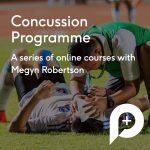Every Monday you will find a top quality research study summarised for you here on Physiospot. The articles are chosen as they are high quality and high impact and likely to shape your clinical practice. After all it’s difficult finding the gems in all the research that’s published daily. So let us do the hard work for you.
Most of the clinical guidelines around concussion are based on athletes and rehabilitation protocols designed for this population. The general consensus is that recovery tends to occur in the first 1-2 weeks in 80-90% of injuries however most of the evidence to support this statement is from high level athletic populations. Furthermore a lot of the evidence in this population is from using self-reported symptoms and the validity of self-reported measures in athletes is poor as they often under-report symptoms in order to return to sport quicker. Applying this to a general population some evidence suggests that self-reported symptoms in a general population did not reflect objective balance data.
Instead of or alongside self-reported outcome measures clinical outcome measures are often used to quantify the effect of concussion. OFten the BESS and C-O-P using posturographic measures are sued as this strikes a strong balance between cost-effectiveness and validity and reliability.
The aim of the Toronto Concussion Study was to determine the recovery of postural control longitudinally following a concussion in community-dwelling adults using BESS score and posturographic measures. It was hypothesized that improvement in all measures would be observed 2 weeks after injury and persist over a 12-week observation window. In this exploratory study, recovery was determined using a Hierarchical Growth Curve Model (HGCM).
Overall sample size varied from week to week with week 1 n=61, week 2 n=58, week 4 n=58, week 8 n=51, week 8 n=51 and week 12 n=39. Between week 4-8 self-reported outcome measures recovered however objectively less than 43% of participants improved beyond their week 1 performance.
Clinical Impact
There hasn’t been much work done on investigating the long term recovery trajectories in balance performance in the general population following concussion. More work is definitely needed however the results from this 12 week longitudinal study is that recovery is variable and does not follow a well definied trajectory. It can also be said that recovery in the general population differs from a sportsperson / athletic background which suggests different rehab protocols or approach to rehab should be different.
